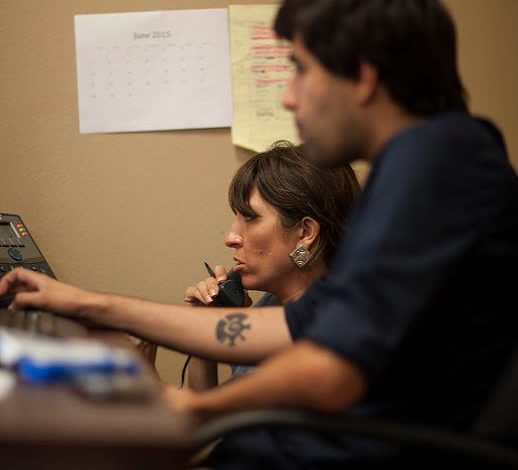The Unitarian Universalist Service Committee advances human rights through grassroots collaborations.
Fleeing Violence, Finding No Refuge

August 28, 2015
This article was originally published in the Summer/Fall 2015 issue of Rights Now.
“We have come to this country, with our children, seeking refugee status and we are being treated like delinquents. We are not delinquents nor do we pose any threat to this country.”
These were the words of at least 80 immigrant women being held at the Karnes detention center in Texas when they declared a hunger and work strike in March to protest the unacceptable conditions they endure. UUSC is actively supporting these women and their children together with the Refugee and Immigrant Center for Education and Legal Services (RAICES), a partner based in San Antonio, Texas.
SEEKING SAFE REFUGE
Over the last several years, there has been an unprecedented increase in the numbers of women and children fleeing Central America and getting caught in the U.S. immigration detention system. Why are these families seeking asylum in the United States? “They are fleeing unspeakable violence,” explained Jonathan Ryan, executive director of RAICES, in an April 2015 segment of the radio show Uprising with Sonali entitled “How the US Locks Up Immigrant Mothers and Babies So Corporations Can Profit.”
While residents of the Northern Triangle of Central America are no strangers to poverty and violence — which have been endemic to the region since the 1980s — crime rates have risen in recent years due to corrupt law enforcement and unchecked gang activity. According to the U.N. Office on Drugs and Crime, Honduras, El Salvador, and Guatemala have the world’s first, fourth, and fifth highest homicide rates, respectively. As a result, families are putting themselves in further danger making their way to the U.S. border in hopes of finding safe refuge. U.S. Customs and Border Protection reported a 50% increase in migration from Central America in 2014 compared to the previous year.
NARY A WARM WELCOME
Do these families find a warm welcome when they arrive at the border? Hardly. In fact, they face quite the opposite. After being apprehended by Border Patrol, families often find themselves in the infamous “ice boxes,” holding cells kept at uncomfortably low temperatures, for indeterminate time periods. Once processed, mothers and their children end up at detention centers like that in Karnes, Texas.
There they experience the following at the hands of U.S. Immigration and Customs Enforcement (ICE):
- Jail-like conditions in facilities run by prison contractors
- Poor food and questionable water sources
- Limited medical care while children shows signs of sickness and malnourishment
- Inadequate resources for proper child development
- Little or no access to information and legal assistance
Even once a woman has passed a “credible fear” interview that is required for individuals seeking asylum, she is often subject to a ridiculously high bond that effectively prohibits her release and that of her children. Rather than finding refuge, these women and their families are facing demoralizing treatment that can only re-traumatize someone who has fled life-threatening violence. In their March statement, the women at Karnes declared, “We deserve to be treated with some dignity and that our rights to the immigration process be respected.”
INFORMATION, DIGNITY, AND ALTERNATIVES TO DETENTION
One of the hardest things about getting stuck in U.S. immigration detention is the lack of information. It can be incredibly hard for asylum seekers — most of whom don’t speak English and have no idea what their rights are or how the process works — to navigate the system. That’s where UUSC and RAICES come in.
UUSC supports RAICES in making the following possible:
- Connecting detained mothers with pro bono lawyers to help them navigate the asylum process
- Offering culturally competent and trauma-informed case management to detained families at several detention centers, including Karnes
- Providing short-term housing options for female asylum seekers being released from the T. Don Hutto Residential Center
- Promoting community-based alternatives to detention, especially for women and their families
Rachel Gore Freed, senior program leader for UUSC’s Rights at Risk Program, explains: “There is no legal justification for detaining these women and children. They are not a danger to the community and often have a vast network to support them financially and emotionally while they pursue their cases. Not only are community- based alternatives equally effective in ensuring that participants follow immigration procedures, but they also save taxpayers significant money and are a much more humane solution for vulnerable families seeking refuge in our country.”
UUSC and RAICES have also joined together with the UU College of Social Justice to recruit several cadres of skilled legal volunteers to assist in this work.
BEYOND KARNES
While the on-the-ground support for women and children in detention at Karnes and similar facilities is vital, UUSC recognizes that this is a structural issue and is advocating on a national level for changes in family detention — namely, to end it.
In February, UUSC launched an online petition asking the Obama administration to end the detention of women and children seeking asylum. “Jail is no place for children,” the petition reads. “It is morally unacceptable that hundreds of refugee children and their mothers are currently being imprisoned in detention camps in the southwestern United States.” The petition garnered more than 5,000 signatures. A follow-up action alert asked supporters to urge their members of Congress to speak out against family detention — and Capitol Hill is paying attention.
In May, concerted advocacy efforts by UUSC and a whole network of allies started paying off when 136 representatives and 33 senators called on the administration to stop detaining families. Then late July in federal court, Judge Dolly Gee ruled that the Obama administration has to stop housing refugee children in jail-like conditions. The initial Flores v. Johnson decision is an important step toward ending family detention.
This issue will not go away anytime soon. Women and children will continue to seek safe refuge within U.S. borders. And UUSC will continue to work with RAICES to ensure that they find some semblance of it.
For the latest updates on UUSC’s work advancing immigration justice, visit uusc.org/immigration.

